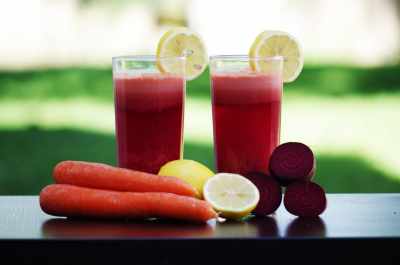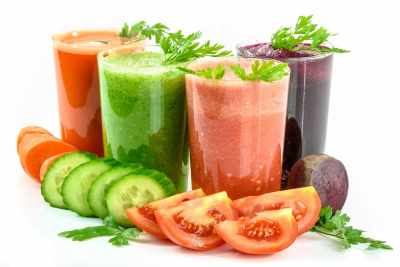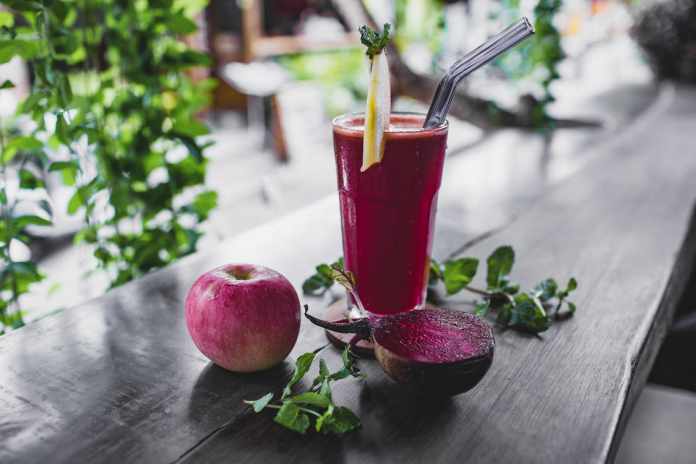Is V8 juice healthy? Well, vegetable juices are becoming extremely popular these days. And one of the most renowned brands for vegetable juice is V8. It contains loads of nutrients, and it’s very good for health overall. So, read on and know why is V8 juice healthy, and it is such a talked-about beverage!
Table of Contents
Why is V8 juice healthy?
V8 juice is considered a healthy beverage compared to many other beverages available in the market. They are an outstanding source of vitamin A and vitamin C.
In addition, they do not contain flavors, colors, and preservatives.
Most of the V8 juices are mainly made up of tomato juice. However, the juice might contain:
| Beet juice |
| Parsley juice |
| Celery juice |
| Lettuce juice |
| Carrot juice |
| Watercress juice |
| Spinach juice |
| Citric acid |
| Salt |
Nutritive value of 100ml V8 juice
It mainly contains many vegetable purees, so it is evident that it contains a high nutrition value. However, it is best you do not substitute V8 juice with your regular vegetables.
100 ml of V8 juice contains:
| Sodium: 267 mg |
| Sugar: 2.92 g |
| Protein: 0.83 g |
| Carbs: 3.75 g |
| Calcium: 12 mg |
| Fiber: 0.4 g |
Now that you know how much nutrition 100ml V8 juice contains, let us check out some more nutrients it contains below!

Vitamin A
220 ml of V8 juice can meet 40% of the daily requirement of vitamin A in your body.
Even though it has vitamin A, experts suggest it is best to eat whole food containing vitamin A. A medium-sized carrot has 9189 IU of vitamin A which is 184% of the daily requirement.
Some of the examples of vitamin A-rich foods are:
- Sweet potatoes
- Eggs
- Bell pepper
- Papaya
- Fish
- Pumpkin
- Kale
- Cod liver oil
- Cantaloupes
Some vitamin A benefits are that it helps to have better night vision in kids, it helps to have proper muscle growth, reduces the risk of urinatory stones, and improves the health of teeth and bone.
Vitamin C
220 ml of V8 juice has 150% of the daily requirement of vitamin C. But most of the juices go under a process called pasteurization which includes heating. Most of the time, heating destroys the goodness of vitamins and minerals. So, you can have V8 juice, but you must also include whole foods in your diet.
Some of the examples of vitamin C rich foods are:
- Kiwi
- Guava
- Orange
- Cooked broccoli
- Kale
- Strawberry
- Bell pepper
- Dairy products
- Chicken liver
- Oysters
V8 juice bad side effects
Now that you know how is V8 juice healthy. But a moderate amount is good for your health, but most dietitians won’t suggest having a store-bought product every day.
Some of the V8 juice bad side effects experts say include:
Fiber deficiency
It has less fiber than whole vegetables and fruits. The main reason fiber is good for us as it helps to control the blood sugar levels and prevents them from fluctuating suddenly.
Thus, it leads to a steady and slow absorption of sugar. Most of the juices do not have enough fiber.
Also, it reduces the risk of paralyze and gall stones, reduces craving, which prevents overeating, good for digestion, improves cholesterol, and prevents constipation. There is less fiber in juice than in whole fruits and vegetables.
Even though V8 juice has less sugar than most fruit juices, it can also suddenly spike blood sugar levels.
Excess salt might cause hypertension
Most processed foods have a lot more sodium than natural salty foods such as sunflower seeds and clams. And too much sodium can cause hypertension or high blood pressure.
According to experts’ individuals who are more than 14 should not intake more than 2300 mg of sodium every day. But it is reported that in the United States, the average amount of salt intake is 3440 mg every day.
220 ml of most V8 juice has 640 mg of sodium in it. Hence it is best not to have more than a glass per day. Moreover, some variety of V8 juice might have more than 640 mg of sodium.
However, few V8 juices have very low sodium quantities. Some of the examples of V8 juices which has a low quantity of sodium per 220 ml are:
- 140 mg – low-sodium original V8 juice
- 140 mg – spicy hot V8 juice
- 150 mg – golden goodness veggie blend
- 210 mg – healthy greens veggie blend
- 640 mg – original V8 juice
- 650 mg – original spicy hot V8 juice
Stomach problems
Diarrhea or loose stool is probably one of the most common problems while consuming V8 juice. However, the side effect will mostly happen if you intake the fusion drinks and not the original V8 https://nowe-kasyna.org/casinos/best-payout-casinos
The original V8 drink only has vegetables in it, whereas the fusion drinks and veggie blends are a mixture of both fruit and vegetable juices.
Furthermore, the sugar present in fruit juices is the main cause of diarrhea, especially when a person will intake large quantities without having any kind of solid/whole foods.
Moreover, individuals who suffer from an intestinal disorder like inflammatory bowel disease (IBD) or irritable bowel syndrome (IBS) will be more sensitive to diarrhea or other stomach problems when drinking fusion juices or any fruit and vegetable juice mixture.
Sugar amount
Even though in 2016, the V8 company said they do not add any extra sugars in their drinks, but the juices do have natural sugars due to the mixed drinks of fruits and vegetables.
However, the sugar content is very low in original V8 juices. But the fusion drinks and veggie blends do have more quantity of sugar.
The high amount of sugar in these drinks might increase blood sugar levels, which is a big concern for individuals who have diabetes or is prediabetic.
Although there are some versions of the V8 juices which has a very low amount of sugar. Some of the examples of V8 juices which has a low quantity of sugar per 220 ml are:
- 6 g – original and spicy hot V8 juice
- 9 g – light peach mango fusion drink
- 16 g – pineapple passion veggie blend
- 25 g – tropical orange fusion drink
Can cause acidity
Some fruit or vegetable juices can cause acidities, such as citrus or tomato juices. People who get heartburn easily find citrus drinks and fruits and tomato products trigger the symptoms.
Some of the V8 juices can stimulate heartburn which is caused by reflux where the abdominal contents escape in the esophagus.
Furthermore, people who have gastroesophageal reflux disease (GERD), long-term reflux, are more vulnerable to the effect. But people can drink a small quantity of the mixed juices where they must include solid food. In this way, they can avoid heartburn.
Pasteurization may destroy important nutrients
Not only is the fiber stripped from the juices, but also the juices go under the process of pasteurization. Through the process of pasteurization, the juice is put on a extremely high heat.
Even though this process makes the product much safer to consume but during this, a lot of beneficial enzymes, vitamins, minerals, and other nutrients get destroyed.
Furthermore, the V8 juices also get reconstituted, which means first they are removed from the water and later add them again. This process makes V8 juices, not 100% fresh vegetable juice.
Natural flavoring
On the ingredient list of V8 juices, one of the items is “natural flavor.” Even though they are derived from foods, but they are synthetic and have a lot of chemicals that might contaminate the drinks up to 80%.
Some of the examples of incidental additives are glycerin, sodium benzoate, and propylene glycol. Sadly, none of these ingredients are mentioned on the label.
How to make vegetable juice at home?
You now know how is V8 juice healthy and what effects it can leave on your health if consumed in large amounts. So, you can consume V8 juice once a week and drink homemade veggie juice the rest of the days.
In that way, you can keep yourself healthy and provide yourself with the correct nutrients in the right amount.
Here are a few recipes you can try out at home.
Raw vegetable juice
To make raw veggie juice a week, here’s what you need to do:
Ingredient list
- Beet – 1 small
- Carrots – 7 medium size
- Green bell pepper – 1
- Yellow bell pepper – 1
- Red bell pepper – 1
- Spinach – 100 g
- Kale – few leaves
- Celery – 2 stalks
- Tomatoes – 2 medium size
- Garlic clove – 1 or 2 (depending upon your preference)
- Sweet onion – ½
- Cabbage – ¼ cup
- Chilli pepper or tabasco sauce – ½ tsp
- Salt to taste.
The method
Wash all the ingredients properly. Cut them into small pieces and add them to the blender. Pour it into the glass and add the chili pepper or tabasco sauce and salt to taste. And your veggie juice is ready!
Vegetable juice
To try out another vegetable juice recipe, here’s what you need to do:
Ingredient list
- Tomato – 5 large ones (chopped)
- Worcestershire sauce – 3 tbsp
- Beet – 1 small
- Parsley – 1 ½ tbsp
- Pepper – ¼ tsp (cracked)
- Carrot – 3 medium sizes (chopped)
- Spinach – 100 g
- Water – 1 cup
- Salt to taste
The method
In a pan, add ½ cup water, beet, carrots, salt, tomatoes, pepper, and Worcestershire sauce. Bring this to a boil and then reduce the flame. Stir it a little, then cover it for 15 – 20 minutes.
Now add the parsley and spinach and cover it again for another 5 – 7 minutes. After that, mix it well and turn off the flame. Let this cool for few minutes.
Lastly, pour this mixture into a blender and add the remaining water to it. It will take about 2 – 3 minutes for the juice to be smooth. Strain the juice and drink it immediately or store it in the fridge for later use.
V8 vs tomato juice
Both V8 and tomato juices are great for health. They both are loaded with vitamin A, vitamin C, iron, and potassium.
However, tomato juice has more iron and potassium, whereas V8 has more vitamin A and vitamin C.

How much nutrition in one cup of V8 juice?
| Vitamin C: 72 mg |
| Vitamin A: 2000 IU |
| Potassium: 470 mg |
| Sodium: 650ml |
| Sugar: 7g |
| Dietary fiber: 2g |
| Protein: 2g |
| Iron: 4% |
| Calories: 50g |
| Carbs: 10g |
How much nutrition in one cup of tomato juice?
| Vitamin C: 45mg |
| Vitamin A: 1094 IU |
| Potassium 556mg |
| Iron: 1.04mg |
| Sodium: 970ml |
| Magnesium: 10% |
| Sugar: 9g |
| Dietary fiber: 3g |
| Zinc: 2% |
| Protein: 2% |
| Protein: 3g |
| Calories: 70 |
| Carbs: 14g |
Both of them have no fat and have calcium 4% each serving. Also, they are both gluten-free and kosher.
V8 juice is a healthy option for those who want a beverage with fewer calories, sugar, and sodium.
But tomato juice has some advantages as well. It has more amount of iron, protein, fiber, and potassium. Also, it has two additional minerals, zinc and magnesium, which are not present in V8 juice.
How much V8 should I drink a day?
According to experts’ adult women should drink two and a half glasses, and adult men must drink three glasses of V8 juice every day. Even though V8 juice healthy, it doesn’t provide any dietary fiber, which is essential for the body.
While making the V8 juice, they get rid of the fiber. Thus, it is healthier to eat raw foods than juices.
Why are fibers necessary?
Here are few things fibers help you with:
Lowers cholesterol levels
It will make you feel fuller for a longer period
Prevents diverticulitis and constipation
Anti-inflammatory and soothes the large intestine
Maintains the blood sugar levels
Hence you still need to eat your vegetables, and you shouldn’t be fully dependent on V8 juices.
Is V8 juice healthy for diabetics?
Now that you know so much, you must be eager to know is V8 juice healthy for diabetes patients or not. Well, let us find out!
V8 juice is moderately fine for diabetic people. But it is better to make your vegetable juice at home with fresh vegetables.
All you need to make the juice are some green leafy veggies, cucumbers, and celery. You can also add some minerals and vitamin supplements to the blender.
However, if you do not like vegetable juices, you can replace them with equally good tomato juice.
Furthermore, for diabetic patients, it is best to stay away from most fruit juice as they contain a lot of sugar.
Some other drinks which are safe for people who have diabetics:
- Green tea
- Unsweetened coffee and tea
- Sugar-free sports drink
- Ice tea
- Americano
- Sugar-free carbonated drinks
- LaCroix (sparkle water)
Final Thoughts
V8 juice is healthy as it is much better than those sugary drinks available in the market. However, processed juice nutrition is nowhere comparable to the nutritional value of whole vegetables. So, you can have V8 juice occasionally, but it is best to focus on eating whole fruits and vegetables.
If you want, you can make your vegetable juice at home, which is a much better and healthier option.













